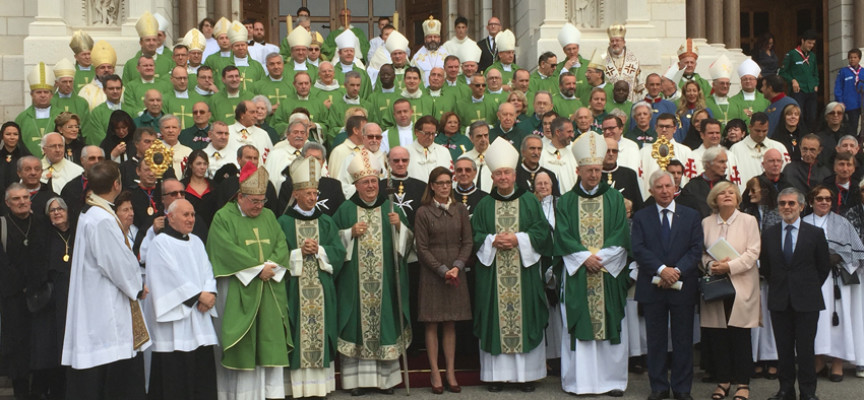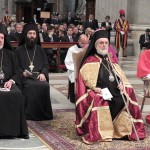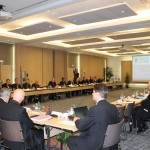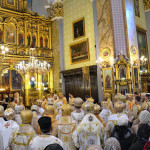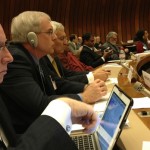The intense and fruitful work took place in an atmosphere of consolidated fraternity and with pastoral love for the peoples of the continent. Starting from the deep experience of unity experienced in these days, the bishops reaffirmed their commitment to reflect on the best ways to value the various social and ecclesial realities today. In the wake of the theme of the next Synod of Bishops, the Presidents agreed to direct the next stages of reflection and work of the CCEE to the pastoral care of young people, their faith, and vocational discernment.
The assembly of Monaco has been enriched by the private audience with Prince Albert II, who welcomed and received the representatives of the European episcopate in the Prince’s Palace.
In Monaco, the Presidents of the Catholic Bishops’ Conferences elected the new CCEE Presidency for the five-year period 2016-2021. As President, they elected Cardinal Angelo Bagnasco, Archbishop of Genoa and President of the Italian Bishops’ Conference. The new Vice-Presidents are Cardinal Vincent Nichols, Archbishop of Westminster and President of the Catholic Bishops’ Conference of England and Wales, and the Archbishop of Poznan, Msgr. Stanisław Gądecki, President of the Catholic Bishops’ Conference of Poland.
The Plenary Assembly expressed its gratitude to the members of the outgoing Presidency, Cardinal Péter Erdő, Archbishop of Esztergom-Budapest (President in the period 2006 through 2016) and the Archbishop of Scutari-Pült, Msgr. Angelo Massafra, for their work for the good of the Church and their dedication in promoting fraternal communion among the European bishops.
Among the topics discussed this year: the mission of the CCEE in the Church in Europe; the situation of Christians in the world, and especially in the Holy Land; the relations with the Orthodox Churches in the light of the recent meeting of Cuba and the Joint Declaration of Pope Francis and Patriarch Kirill. This discussion was also attended by our guests who represented the continental ecclesial bodies for Africa (SECAM), Latin America (CELAM), Asia (FABC), and Oceania (FBCO), who informed the other participants about the challenges of the Church in their respective continents.
In Nice, the bishops visited the memorial for the victims of the attack of July 14, 2016, on the “Promenade des Anglais” for a short moment of prayer and recollection.
During the meeting they also heard the reports of the CCEE commissions. The Assembly welcomed the efforts and the projects and confirmed its gratitude and appreciation for their work. The bishops then heard the reports of the Catholic Church representatives who follow the activities of the European institutions, and expressed their appreciation for the work carried out by the Apostolic Nuncio in Brussels, the COMECE, and the Permanent Mission of the Holy See to the Council of Europe.
The Conference ended with the adoption of a clear and strong message which included the condemnation of the persecution of Christians across the world and the various forms of intolerance or discrimination suffered by Christians in Europe.
The next CCEE plenary assembly will take place from the 28th of September to the 1st of October, 2017, in Mińsk (Belarus) on the invitation of the local archbishop, Msgr. Tadeusz Kondrusiewicz, President of the Catholic Bishops’ Conference of Belarus.
I lavori intensi e proficui si sono svolti in un clima di consolidata fraternità e con amore pastorale per i popoli del continente. Partendo dalla profonda esperienza di unità sperimentata in questi giorni, i vescovi hanno riaffermato il loro impegno a riflettere sulle vie che è necessario percorrere oggi per valorizzare le varie realtà sociali ed ecclesiali. Sulla scia dell’annuncio del tema del prossimo Sinodo dei vescovi, i presidenti hanno deciso di orientare le prossime tappe della riflessione e del lavoro del CCEE alla cura pastorale de giovani, della loro fede e del discernimento vocazionale.
L’assise di Monaco è stata arricchita dall’incontro con il Principe Alberto II, che ha accolto e ricevuto in udienza nel Palazzo Principesco i rappresentanti dell’episcopato europeo.
A Monaco, i Presidenti delle Conferenze episcopali hanno eletto la nuova Presidenza del CCEE per il quinquennio 2016-2021. Alla carica di Presidente è stato eletto il Cardinale Angelo Bagnasco, Arcivescovo di Genova e Presidente della Conferenza episcopale italiana. Alla carica di Vicepresidenti, il Cardinale Vincent Nichols, Arcivescovo di Westminster e Presidente della Conferenza episcopale d’Inghilterra e Galles, e l’arcivescovo di Poznań, Mons. Stanisław Gądecki, Presidente della Conferenza episcopale polacca.
L’assemblea plenaria ha ringraziato i membri della Presidenza uscente, il Cardinale Péter Erdő, Arcivescovo di Esztergom-Budapest (Presidente dal 2006 al 2016) e l’Arcivescovo di Scutari-Pült, Mons. Angelo Massafra, per il lavoro svolto per il bene della Chiesa e per la dedizione nel promuovere la comunione fraterna tra gli episcopati europei.
Tra i temi affrontati quest’anno: la missione del CCEE nella Chiesa in Europa; la situazione dei cristiani nel mondo, e in particolare in Terra Santa; i rapporti con le chiese ortodosse alla luce del recente incontro di Cuba e della dichiarazione comune di Papa Francesco e del Patriarca Kirill. A questo scambio hanno partecipato anche i rappresentati ospiti degli organismi ecclesiali continentali per l’Africa (Secam), l’America Latina (Celam), l’Asia (FABC) e l’Oceania (FBCO) informando tra l’altro i partecipanti delle sfide della Chiesa nei loro rispettivi continenti.
A Nizza, i vescovi si sono recati presso il memoriale per le vittime dell’attentato del 14 luglio 2016 sulla “Promenade des anglais” per un breve momento di preghiera e di raccoglimento.
Nel corso dell’incontro sono stati ascoltati i rapporti delle commissioni del CCEE. L’Assemblea ha apprezzato l’impegno e i progetti confermando la propria gratitudine e stima per il lavoro svolto. I vescovi hanno poi ascoltato i rapporti dei rappresentanti ecclesiali che seguono l’attività delle Istituzioni europee, mostrando il loro apprezzamento per il servizio svolto dalla Nunziatura Apostolica a Bruxelles, dalla COMECE e dalla Missione permanente della Santa Sede presso il Consiglio d’Europa.
I lavori si sono conclusi con l’adozione di un chiaro e forte messaggio di condanna delle persecuzioni contro i cristiani nel mondo e delle varie forme d’intolleranza o di discriminazione subite dai cristiani in Europa.
La prossima Assemblea plenaria si svolgerà dal 28 settembre al 1 ottobre 2017 a Mińsk (Bielorussia) su invito dell’Arcivescovo locale, Mons. Tadeusz Kondrusiewicz, Presidente della Conferenza episcopale bielorussa.
Evangéliser l’Europe
La rencontre annuelle du CCEE qui, cette année, fête ses 45 ans, a eu lieu dans la Principauté de Monaco (6-9 ottobre 2016), à l’invitation de l’Archevêque local, Mgr. Bernard Barsi.
Les travaux, intenses et fructueux, se sont déroulés dans une atmosphère de fraternité consolidée et avec amour pastoral pour les peuples du continent. A partir de la profonde expérience d’unité vécue durant ces journées, les évêques ont réaffirmé leur engagement à réfléchir sur les chemins à parcourir aujourd’hui pour mettre en valeur les différentes réalités sociales et ecclésiales. Dans le sillage du thème du prochain Synode des Évêques, les Présidents sont convenus d’orienter les prochaines étapes de réflexion et de travail du CCEE vers le soin pastoral des jeunes, de leur foi et du discernement vocationnel.
L’Assemblée de Monaco a été enrichie par la rencontre avec le Prince Albert II, qui a accueilli et a reçu en audience au Palais Princier les représentants de l’épiscopat européen.
A Monaco, les Présidents des Conférences épiscopales ont élu la nouvelle Présidence du CCEE pour le quinquennat 2016-2021. Pour le Président, le choix s’est porté sur le Cardinal Angelo Bagnasco, Archevêque de Gênes et Président de la Conférence épiscopale italienne. Les Vice-présidents élus sont le Cardinal Vincent Nichols, Archevêque de Westminster et Président de la Conférence épiscopale d’Angleterre et du Pays de Galles, et l’Archevêque de Poznan, Mgr. Stanisław Gądecki, Président de la Conférence épiscopale polonaise.
L’Assemblée plénière a voulu remercier les membres de la Présidence sortante, le Cardinal Peter Erdö, Archevêque d’Esztergom-Budapest (Président de 2006 à2016) et l’Archevêque de Scutari-Pult, Mgr. Angelo Massafra, pour leur travail en faveur du bien l’Eglise et pour leur dévouement dans la promotion de la communion fraternelle entre les épiscopats européens.
Parmi les sujets abordés cette année: la mission du CCEE dans l’Eglise en Europe; la situation des chrétiens dans le monde, notamment en Terre Sainte; les relations avec les Eglises orthodoxes, à la lumière de la récente rencontre de Cuba et de la déclaration commune du Pape François et du Patriarche Kirill. A cet échange on participé également les représentants des organismes ecclésiaux continentaux pour l’Afrique (SECAM), l’Amérique latine (CELAM), l’Asie (FABC) et l’Océanie (FBCO) qui ont également informé les participants des défis auxquels l’Eglise doit faire face dans leurs continents respectifs.
A Nice, les évêques se sont rendus au mémorial pour les victimes de l’attentat du 14 Juillet 2016 sur la “Promenade des Anglais”, pour un bref moment de prière et de recueillement.
Au cours de la réunion, les participants ont pu écouter la présentation des rapports des Commissions du CCEE. L’Assemblée a apprécié les efforts et les projets mis sur pied, et elle a voulu confirmer sa gratitude et sa reconnaissance pour leur travail mené. Suite à cela, les représentants ecclésiaux qui suivent les activités des Institutions européennes on présenté leurs rapports et les évêques ont exprimé leur appréciation pour le travail mené par la Nonciature Apostolique à Bruxelles, par la COMECE et par la Mission Permanente du Saint-Siège auprès du Conseil de l’Europe.
La Conférence a pris fin avec l’adoption d’un message clair et fort visant à condamner la persécution des chrétiens dans le monde et les différentes formes d’intolérance ou de discrimination subies par les chrétiens en Europe.
La prochaine Assemblée plénière aura lieu du 28 Septembre au 1er Octobre 2017 Mińsk (Biélorussie) à l’invitation de l’Archevêque local, Mgr. Tadeusz Kondrusiewicz, Président de la Conférence épiscopale de Biélorussie.
Europa evangelisiere
Das jährliche Treffen des CCEE, der in diesem Jahr sein 45-jähriges Bestehen begeht, fand auf Einladung des örtlichen Erzbischofs, Msgr. Bernhard Barsi, im Fürstentum Monaco statt (6.-9. Oktober 2016).
Die intensive und fruchtbare Arbeit verlief in einer konsolidierten Atmosphäre der Brüderlichkeit und mit pastoraler Liebe für die Völker des Kontinents. Ausgehend von der Erfahrung tiefer Einheit, die sie in diesen Tagen erlebt haben, bekräftigten die Bischöfe ihren Einsatz, die notwendigen Wege zu erörtern die es heute zu beschreiten gilt, um die verschiedenen sozialen und kirchlichen Realitäten aufzuwerten. Im Zuge des angekündigten Themas der nächsten Bischofssynode, haben die Vorsitzenden beschlossen, die nächsten Etappen der Reflexion und der Arbeiten des CCEE der Jugendpastoral, dem Glauben und der Berufungsfindung junger Menschen zu widmen.
Die Versammlung wurde durch die Begegnung mit Fürst Albert II. bereichert, der die Vertreter des europäischen Episkopats in Audienz im Fürstenpalast empfing.
Die Vorsitzenden der Bischofskonferenzen haben in Monaco die neue CCEE-Präsidentschaft für die nächsten fünf Jahre (2016 – 2021) gewählt. Als Vorsitzender wurde Kardinal Angelo Bagnasco, Erzbischof von Genua und Vorsitzender der Italienischen Bischofskonferenz, als Vize-Vorsitzende Kardinal Vincent Nichols, Erzbischof von Westminster und Vorsitzender der Bischofskonferenz von England und Wales und Msgr. Stanisław Gądecki, Erzbischof von Poznań und Vorsitzender der Polnischen Bischofskonferenz, gewählt.
Die Vollversammlung dankte den ausscheidenden Mitgliedern der Präsidentschaft, Kardinal Péter Erdő, Erzbischof von Esztergom-Budapest (Vorsitzender von 2006 bis 2016) und Msgr. Angelo Massafra, Erzbischof von Shkodra-Pult für die geleistete Arbeit zum Wohl der Kirche und für ihren Einsatz, die brüderliche Gemeinschaft unter den europäischen Bischöfen zu fördern.
Folgende Themen wurden u.a. in diesem Jahr behandelt: Der Auftrag des CCEE in der Kirche Europas; die Situation der Christen in der Welt, vor allem im Heiligen Land; die Beziehungen zu den orthodoxen Kirchen im Licht der kürzlich stattgefundenen Begegnung auf Kuba und der Gemeinsamen Erklärung von Papst Franziskus und Patriarch Kyrill. An diesem Austausch nahmen als Gäste auch Vertreter kirchlicher Organe in anderen Kontinenten teil: Afrika (SECAM), Lateinamerika (CELAM), Asien (FABC) und Ozeanien (FBCO). Sie informierten die Teilnehmer auch über die Herausforderungen der Kirche in ihren jeweiligen Kontinenten.
In Nizza begaben sich die Bischöfe auf die “Promenade des anglais” und hielten an der Gedächtnisstätte des Attentates vom 14. Juli 2016 einen kurzen Augenblick der Stille und des Gebets.
Während des Treffens wurden die Berichte der CCEE-Kommissionen angehört. Die Versammlung würdigte die Bemühungen und Projekte und bestätigte seine Dankbarkeit und Anerkennung für die geleistete Arbeit. Weiter folgten die Bischöfe den Berichten kirchlicher Vertreter, die in Aktivitäten europäischer Institutionen eingebunden sind. Sie gaben ihrer Anerkennung für die von der Apostolischen Nuntiatur in Brüssel, der COMECE und der Ständigen Vertretung des Heiligen Stuhls beim Europarat geleisteten Arbeit Ausdruck.
Auf Einladung des Erzbischofs vor Ort, Msgr. Tadeusz Kondrusiewicz, Vorsitzender der Bischofskonferenz in Weißrussland, wird die nächste Vollversammlung vom 28. September bis 1. Oktober 2017 in Mińsk (Weißrussland) stattfinden.
Latest posts by EURCOM (see all)
- What are the aims of the European security and defence policy? - 12 aprile 2017
- The Church is for the European project - 28 marzo 2017
- A message for Europe - 28 marzo 2017

